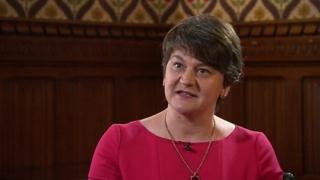
The DUP will not support a Brexit deal which could lead to any new checks on goods coming into NI from elsewhere in the UK, its leader has emphasised.
"We cannot have either a customs border or a regulatory border down the Irish Sea," said Arlene Foster. "That would make us separate from the UK."
There has been speculation the UK could agree to regulatory checks at Irish Sea ports as part of a backstop deal.
Both sides have agreed the need for a backstop but not how it should operate.
It would apply if the Irish border cannot be kept as frictionless as it is now in the context of a wider deal.
The EU has proposed a backstop that would mean Northern Ireland staying in the EU customs union, large parts of the single market and the EU VAT system.
'We are not bluffing'
The UK government has rejected it as a threat to the integrity of the UK and suggested a backstop that would see the UK as a whole remaining aligned with the EU customs union for a limited time after 2020.
It has not yet brought forward plans about how to deal with regulatory issues - EU single market rules on food, agriculture and other manufactured goods.
NI secretary Karen Bradley told the Conservative Party conference the government would "never ever allow a border down the Irish Sea".
What do 'checks in the Irish Sea' mean?
In a backstop situation, there could in theory be two types of Irish Sea checks:
- Customs - to make sure the right EU tariffs have been paid
- Regulatory - to make sure goods meet EU safety and quality standards
The government has been adamant it would never accept Irish Sea customs checks.
But it has also been careful not to completely close down the prospect of regulatory checks.
Mrs Foster said her party would not accept customs or regulatory checks in the Irish Sea as a means of breaking the Brexit deadlock.
"We are not going to allow the UK to be broken up by Brussels or anybody else," she told a DUP fringe event at the conference in Birmingham.
"It won't be a semi detached part. [EU chief negotiator Michel] Barnier cannot annex the UK. We are not bluffing."
In recent months, Mr Barnier has talked about "de-dramatising" the backstop.
It is understood he believes any new physical checks could be limited to food products coming into NI from the rest of the UK.
Arlene Foster said the Brexit process was reaching a "crunch time" and her party was speaking to the government on an ongoing basis.
Following the general election in June 2017, the DUP and Conservatives formed a confidence-and-supply deal.
Theresa May relies on the DUP's 10 MPs' support to give her a majority in Parliament.
'Reckless'
The 1998 Good Friday Agreement saw the removal of security checkpoints from crossing points and helped make it an all but invisible divide - something which was relatively easy to achieve due to the UK and the Republic of Ireland's shared EU membership.
However, since the Brexit referendum, the Irish question has remained a serious point of contention.
Mrs Foster has come under fire for suggesting the terms of the agreement could be altered in efforts to strike an EU exit deal.
Irish foreign minister Simon Coveney said that whilst he respected the DUP leader, she was wrong to say the agreement was not sacrosanct.
The agreement provided for the most prolonged period of peace and stability in Northern Ireland's history and the Irish government would defend and protect it though the Brexit process, tweeted Mr Coveney.
Sinn Féin leader Mary Lou McDonald had earlier called on the Irish Government to "protect" the Good Friday Agreement, dismissing Mrs Foster's comments as "reckless".
The Good Friday agreement was "not a chip to be bargained with as part of the Tory-DUP deal", she said.
Speaking to the BBC's Talkback programme, Mrs McDonald accused the DUP of "playing a game of Chicken" with people's livelihoods.
She said that Mrs Foster's remarks revealed the DUP was "not wedded to the Good Friday Agreement", and that they represented "an explanation... as to why [the DUP] has actively frustrated political progress, and in the area of rights in particular".
The Northern Ireland power-sharing executive at Stormont - which was established by the agreement - collapsed in January 2017.
One of the main stumbling blocks has been Sinn Féin's demand to give official status to the Irish language.
Other dividing issues include rights for same-sex couples to marry and measures to deal with investigations into killings during the Troubles.